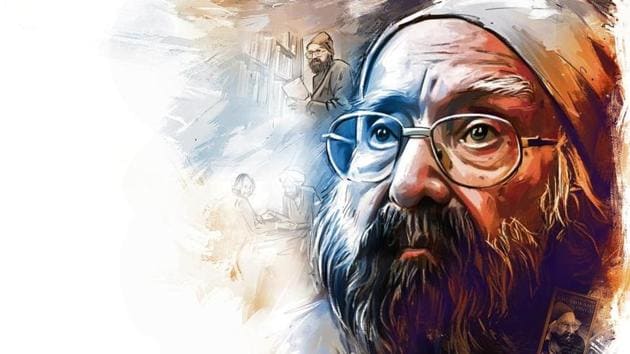Khushwant Singh: Noted writer and journalist
Novelist, journalist, diplomat and lawyer, he is today best known for his literary works. Winner of Padma Vibhushan and Sahitya Akademi Fellowship, he wrote his most notable work, Train to Pakistan, recounting his experiences of the partition of India.
Born to Sir Sobha Singh, a prominent builder, and Veeran Bai at Hadali in Punjab’s Khushab district (now in Pakistan). During those times, most births and deaths were not recorded. Therefore, his father simply wrote February 2, 1915, while he was admitting Khushwant Singh to Modern School in Delhi. Although his beloved grandmother, Lakshmi Bai said he was born in August, prompting Singh to later “set his birthday” to August 15. His grandmother had given him the name Khushal Singh and his pet name was “Shalee”. He chose Khushwant as his first name to rhyme with that of Bhagwant, his elder brother. He believed that his new name was “self-manufactured and meaningless.”

EDUCATION
Singh received his early education at Modern School in Delhi. For higher education, he attended Government College in Lahore, St Stephen’s College in Delhi, and King’s College in London. He worked as a lawyer for several years but the work did not give him satisfaction. He then served in the Indian Foreign Service (IFS) as an information officer of the Indian government in Toronto, Canada. After that, he had also worked as Press Attaché and Public Officer for the Indian High Commission in the cities: London and Ottawa.
JOURNALISM & WRITING
All these years he had been reading a lot of books. In 1951, he left the IFS and became a journalist at All India Radio. From 1954 to 1956, he worked in the Department of Mass Communications of UNESCO in Paris. Journalism and writing gave him a sense of fulfillment. He was the editor of several reputed newspapers and magazines such as The Illustrated Weekly of India, The National Herald and Hindustan Times. During his nine-year tenure as editor of The Illustrated Weekly, the circulation rose from 65,000 to 400,000. He had also founded and edited Yojana, an Indian government journal. From 1980 to 1983, he was the editor of Hindustan Times. After his tenure as editor was over, he continued to write a column called With Malice Towards One and All which was widely read. It was famous for its wit and wisdom. He wrote numerous fiction and non-fiction works which came to be very popular. His works were engaging , interesting and most became bestsellers. Some of his popular works were Train to Pakistan, Delhi: A Novel, and his autobiography Truth, Love and a Little Malice. His 1953 book, A History of the Sikhs, is considered to be the most authoritative work on that subject.
POLITICS
Singh was a member of Rajya Sabha from 1980 to 1986. For his service to society and culture, he was awarded a Padma Bhushan, but he returned it to the government in protest against Operation Blue Star wherein the Indian Army laid siege and cleared terrorists from the Golden Temple in Amritsar.
PERSONAL LIFE
Singh was married to Kawal Malik who was a childhood friend of his. They had two children, Rahul Singh and Mala Singh. He declared himself as an agnostic and never said prayers. This was evident in his 2011 work titled Agnostic Khushwant: There is no God. He passed away on March 20, 2014 in Delhi and is survived by his son and daughter.
INTERESTING FACTS
1. He once described what it takes to be a writer: “Sometimes you will sit for hours staring at a blank sheet of paper. You will have to have the determination not to get up till the sheet is filled with writing.”
2. Singh had said that his belief in India’s political system was disturbed once he noticed the after-effects of the anti-Sikh riots that broke out in the country after Indira Gandhi’s assassination.
3. He advocated good diplomatic relations between India and Israel and not displease Arab nations where Indians worked. On his visit to Israel Singh was impressed by their progress.
4. Khushwant Singh was against all organised religions. According to him, “One can be a saintly person without believing in God and a detestable villain despite believing in him. In my personalised religion, there is no God!” Singh had further said that he did not believe in rebirth or reincarnation of man and the day of judgment, heaven or hell. He believed in the concept that death is final.
Sources: Truth, Love and a Little Malice, Wikipedia







